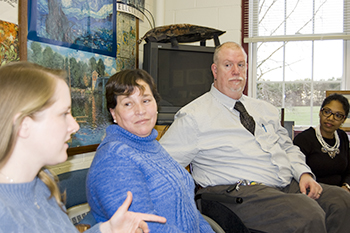Combine your life experiences with what you learn through WRAP & Peer Support to feel better, get well, stay well and make your life the way you want it to be.
Following is from the ALL NEW WRAP and Peer Support Handbook
 You will hear the words “Moving Forward” over and over in this book. I like the word recovery but I like the words “Moving Forward” even better. It seems to more accurately represent what I am working on with my WRAP—”Moving Forward”. Using Peer Support concepts and processes and the skills and strategies that are described in this book, and those you figure out for yourself, you and the people you are “doing” Peer Support with figure out new ways to have the potential to Move you Forward. Use WRAP and Peer Support strategies to take you to where you want to be in your life – to “Move Forward.”
You will hear the words “Moving Forward” over and over in this book. I like the word recovery but I like the words “Moving Forward” even better. It seems to more accurately represent what I am working on with my WRAP—”Moving Forward”. Using Peer Support concepts and processes and the skills and strategies that are described in this book, and those you figure out for yourself, you and the people you are “doing” Peer Support with figure out new ways to have the potential to Move you Forward. Use WRAP and Peer Support strategies to take you to where you want to be in your life – to “Move Forward.”
When you are sharing experiences with each other in Peer Support, you use your combined experience and knowledge to “Move Forward,” perhaps making changes in the ways you do things and the things you do that feel better and more right to you. “Moving Forward” is what this work is all about, moving from one place in your life to another place in your life that feels better and more right to you. The changes may be small or they may be big—wherever you are in your life and whatever you feel is right to do.
Examples of Moving Forward
Tom told Marcy that he has a hard time figuring out what he needs to do every day to keep himself well, but that he is getting better at it since he heard how other people were doing it in the WRAP Group—putting lists on the refrigerator and keeping supplies on hand. Marcy says that is not always easy for her either, but over time she has gotten used to doing the things she knows she needs to do every day. She says motivation is sometimes hard for her but knows Tom has some experience with this and he shares ideas that she says she will try.
Jack and Sarah were talking about college. Jack said he always wanted to go to college but was afraid it would be too much for him. He said that seeing himself as a mental patient had made him feel fragile and incapable of taking a major step like this. Sarah said that after being hospitalized several times for deep sadness, she noticed that she started giving up plans for her life that were important to her, like going on to school and having a family. She told Jack that she had overcome those hurdles and moved on and was sure that he could too. Jack asked her more questions about making that change and noticed that he was beginning to feel more hopeful about taking the next steps so that he could go to college.
The WRAP and Peer Support Handbook guides participants to “Move Forward,” to think about the possibilities and make plans. Combine your life experiences with what you learn through WRAP & Peer Support and recovery is not a far off hope, but a reality.
Order Your Copy of the WRAP and Peer Support Handbook
& Learn More About Peer Support Concepts

Mary Ellen Copeland, PhD, developed Wellness Recovery Action Plan (WRAP) with a group of people with lived experience who were attending a mental health recovery workshop in 1997. She is the original author of the WRAP Red Book, as well as dozens of other WRAP books and materials. She has dedicated the last 30 years of her life to learning from people who have mental health issues; discovering the simple, safe, non-invasive ways they get well, stay well, and move forward in their lives; and then sharing what she has learned with others through keynote addresses, trainings, and the development of books, curriculums, and other resources. Now that she is retired, and that, as she intended, others are continuing to share what she has learned, she continues to learn from those who have mental health issues and those who support them. She is a frequent contributor to this site.






